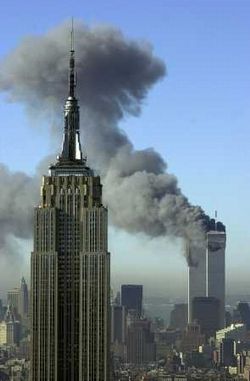After 9/11, What Role Should Government Play In Civil
Aviation?
They say that breakin' up is hard to do;
now I know, I know that it's true.
Don't say that this is the end.
Instead of breakin' up
I wish that we were makin' up again.
--"Breaking Up Is Hard To Do," Neil Sedaka & Howard
Greenfield
 It's been the lament of the airline industry since
Washington decided to deregulate the airline industry almost 25
years ago. Let the marketplace decide, said the lawmakers. Let the
unions and the owners work it out for themselves, they said. Keep
the foreign investors from owning a majority of shares in any
airline and the customer will ultimately benefit. Really. That's
the plan.
It's been the lament of the airline industry since
Washington decided to deregulate the airline industry almost 25
years ago. Let the marketplace decide, said the lawmakers. Let the
unions and the owners work it out for themselves, they said. Keep
the foreign investors from owning a majority of shares in any
airline and the customer will ultimately benefit. Really. That's
the plan.
25 Years Later, How's That Working Out?
Not so well, according to some lawmakers and industry experts.
The New York Times reports in Sunday's editions that one
problem is what's left of the cozy, regulated relationship prior to
deregulation and the idea among some observers that different
carriers get different treatment at different times in their
economic cycles.

The Times quotes Clifford Winston, a Brookings
Institute economist, as saying, the government's "residual
presence" in the industry has created "a mindset that you can use
the government for your own purposes" and "has diverted the
carriers' attentions from working out their problems
themselves.
Airlines To TSA: Show Us The Money
Case in point: Airlines, whomped by the September 11, 2001,
attacks, have already received one bailout from the government in
the amount of $15 billion. Now... another aid bill, this one worth
$3.8 billion, is pending. Yet, it is embroiled in controversy about
which airline should get how much, or whether any airline should
get anything at all. "It is largely start-and-stop right now," Rep.
James L. Oberstar (D-MN), the Democrats' ranking member on the
House Transportation Committee, told the Times. The money,
approved by President Bush last month, is supposed to reimburse
airlines for the costs of enhanced security. Most of the money to
pay for the bill comes from - you guessed it - the airlines
themselves, in the form of a $2.50 tax on every leg of every trip.
Beleagured airlines are hopping mad over that one.
 The
TSA is now trying to mete out the aid to 71 different airlines
impacted by 9/11, SARS, the war on terror and the war in Iraq.
The
TSA is now trying to mete out the aid to 71 different airlines
impacted by 9/11, SARS, the war on terror and the war in Iraq.
"It is Congress' responsibility post-9/11 to assume the security
costs as a part of national defense," Jim May, chief executive of
the ATA, told the Times. "You can't pay for it, then, when
it's convenient, lay it off on the airlines." ATA wants the tax
permanently revoked.
But critics disagree. Kevin Mitchell, president of the Business
Travel Coalition, says having the airlines pay for enhanced
security is just like having the airlines pay for engine
maintenance. "They have to address those new risks and those new
requirements in order to service their customers," he told the
Times. "That seems to be an identifiable new part of the
environment. Why are taxpayers funding that?" Well, taxpayers may
not be, but air passengers are still paying that $2.50/leg tax.
"That's puzzling to me how that worked out," said Oberstar in
the Times article, saying he's not in favor of rescinding
the security tax.
Brookings' economist Winston puts it this way: this entire
bail-out mess is just another example of the government getting
"involved in areas where it doesn't have expertise."
 Aero-News: Quote of the Day (12.18.25)
Aero-News: Quote of the Day (12.18.25) Classic Aero-TV: Viking Twin Otter 400--Bringing the DHC-6 Back Into Production
Classic Aero-TV: Viking Twin Otter 400--Bringing the DHC-6 Back Into Production NTSB Final Report: Rans Employee Flying Club Rans S-6ES Coyote II
NTSB Final Report: Rans Employee Flying Club Rans S-6ES Coyote II ANN FAQ: Submit a News Story!
ANN FAQ: Submit a News Story! ANN's Daily Aero-Term (12.18.25): Braking Action Advisories
ANN's Daily Aero-Term (12.18.25): Braking Action Advisories





